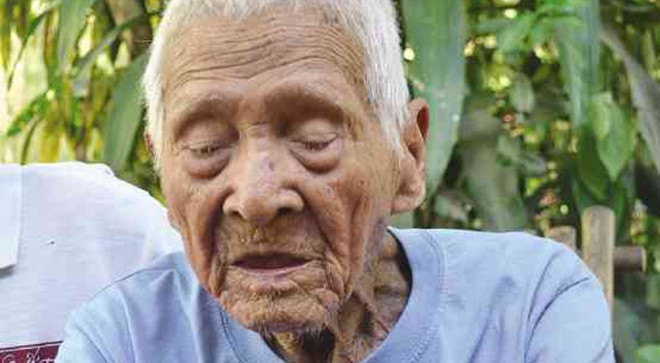
BONIFACIO Agacer, 103, is considered to be the oldest war veteran in Pangasinan. From fighting Japanese forces during the second world war, Agacer is now fighting poverty and a declining health as he says he wants to live to be 107 years old. CONTRIBUTED PHOTO
LINGAYEN, Pangasinan—From his rickety bed in his shanty in Barangay (village) Salud in Natividad town, World War II veteran Bonifacio Agacer, 103, is still fighting.
But this time, his fight is no longer against the Japanese Imperial Army that invaded the country in 1941 but against poverty and age that have slowly consumed him.
“I’m fighting to live until I’m 107 [years old],” said Agacer in a taped interview.
Agacer, the oldest of the 759 war veterans in Pangasinan, was honored along with other veterans, most of them aging and ailing, during the 7th Veterans’ Day celebration here on Thursday.
The event coincided with the 69th anniversary of the Lingayen Gulf Landings, the day in 1945 when American Gen. Douglas MacArthur and the Allied Forces landed on the shores of the Lingayen Gulf, eventually liberating Luzon from the Japanese.
Australian Ambassador to the Philippines Bill Tweddell, Philippine Veterans Affairs
Office Administrator Ernesto Carolina and Returned Services League of Australia president James Curtis-Smith led the wreath-laying ceremony at the Veterans’ Memorial Park here.
Oldest surviving veteran
Agacer’s son, Mariano, 80, a farmer, said he wanted his father to attend the ceremony but he could no longer move without assistance.
Mariano and his sister, Jovita Baroga, 70, also a farmer, instead attended the event, where they received, on behalf of their father, an award for the “Oldest Surviving Veteran.”
Agacer also received a certificate for free lifetime medical and diagnostic care services from the Provincial Health Office, a P20,000 cash gift and plaques of recognition.
Stories of war
Mariano said his father, the only boy in a brood of four, joined the guerrilla movement when he was 33 after he was recruited by Col. Alfredo Balingao of neighboring Tayug town.
“He would tell us stories when we were children about his exploits during the war,” said Mariano.
He said his father was part of a team that destroyed a bridge in eastern Pangasinan to prevent Japanese soldiers from reaching the Caraballo Mountains, where the guerrilla fighters were hiding.
“He told us that he walked 12 kilometers barefoot to bring water and food supplies to the guerrilla camp,” Mariano said.
After the war, Agacer was conferred the rank of private by the Philippine Army and was recognized as a war hero. He continued farming in the village, which is at the foot of the Caraballo Mountains.
Letters
“There was a time when we received letters from the United States Embassy. But we understood nothing, so we just ignored them,” Mariano said, adding that his father finished only the fourth grade.
In 2000, Mariano said his father received a lump sum of P80,000 from the government. After that, he began receiving P6,700 in monthly pension, which was barely enough for his medical needs and daily subsistence.
“My sister and I are the ones taking care of him,” said Mariano.
Agacer has since lost his strength and has difficulty speaking and recognizing people, even his own children.
‘He told us that he walked 12 kilometers barefoot to bring water and food supplies to the guerrilla camp…’